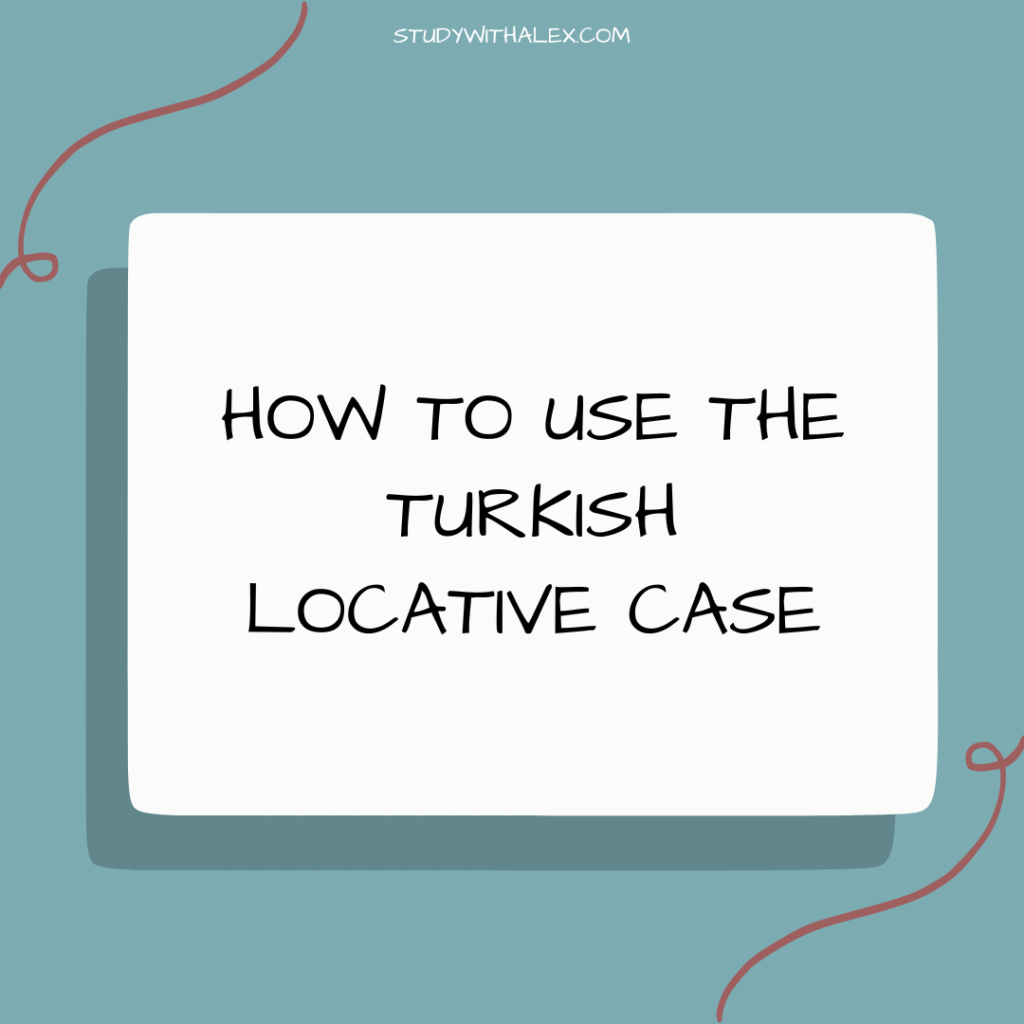The Turkish locative case is one of many cases. I’ve written about the other cases like dative or accusative before. Fortunately, this one is not as confusing as that one. Turkish learners might overestimate their ability to use this case, so it’s important to truly understand the logical underpinnings of this case.

What is the Turkish locative case?
The simplest English translation for the Turkish locative case is “in,” “on,” or “at,” but it is a little more complicated than just that. If we generalized, we could say it is about location. Wow, who could have guessed the locative case is about location?
How do form the locative case? You will add one syllable to the end of your Turkish noun that will vary according to vowel harmony. You will use -t- or -d-, and you will use -a or -e. More specifically, all the possible endings for the locative case are: -da, -ta, -de, -te. Which you will use will depend on the final syllable of the noun.
Technically, there is buffer -n- included with the locative. It will appear only when the noun is possessed by him, her, or them. A 3rd person possessive gets a -ı or -sı, which means it ends with a vowel. However, you cannot add -da; you must add -nda.
kedi > kedisi > kedisinde
cat > his cat > on his cat
ev > evi > evinde
house > his house > at his house
para > parası > parasında
money > his money > on his money
Please notice the ambiguity of evinde. It can be “at his house” or “at your house.” Be careful.
Here are the 5 rules to know when to use the Turkish locative case:
Rule 1: adverbial of place – you did it where?
In a sentence with a verb, you usually need to describe where it is happening. You will use the Turkish locative case.
Arkadaşımın evinde uydum.
= I slept at my friend’s house.
Kedi mutfakta yedi.
= The cat ate in the kitchen.
Rule 2: adverbial of time – you did it when?
Time is critical, and you will usually use the Turkish locative case to mark it.
Son zamanlarda daha fazla Türkçe öğrendim.
= Recently (literally, at the last times) I studied more Turkish.
Arkadaşım sabahlarda kahvaltı yapmaz.
= My friend does not eat breakfast in the mornings.
The only times you won’t use this case despite being a time is the incredibly common adverbials of time like bugün or yarın.
Rule 3: the complement of a subject – you are where?
For English speakers, you might think this is the same as rule 1, but it’s distinct and deserves its own rule. If you are at a location, you will use the Turkish locative case.
Dükkandasın.
= You are at the store.
Ayasofya İstanbul’da.
= The Hagia Sophia is in Istanbul.
Rule 4: a descriptive construction about age, size, shape, etc.
This use is one of the first expressions you learn in Turkish. When you talk about your age, you learn yaşında. This has an adjectival meaning – it’s obviously not a verb – and therefore can be put in the place where adjectives go. This rule also applies for things like “in the size of X” or “in the shape of.”
Bahçede bir üzümün büyüklüğünde bir sivrisinek gördüm.
= I saw a mosquito the size of a grape in the garden.
Ördeğin şeklinde bulut çocuğu güldürdü.
= The cloud in the shape of a duck / the duck-shaped cloud made the child laugh.
Rule 5: the object of particular verbs or adjectives
This is the most illogical rule. There is not reason here – you just have to memorize. A very small number of verbs take this case as an object. In your English head, it should be an object and therefore accusative, but it must be locative.
İskender kebapta karar kıldık.
= We decided on the Iskender Kebab.
Sana söylemekte sakınca görmüyorum.
= I don’t mind telling you. (literally, I don’t see harm in…)
Summary
- do something at a place
- do something at a time
- be at a place
- be at the size of, be at the age of, be in the shape of
- a small arbitrary group of verb complements
Now, you know when you can use the Turkish locative case, so you can use it more naturally.
Among Turkish noun cases, this one is pretty close to the logic of English native speakers, so it is not the hardest. However, you could get tripped up over rule 5, so be sure to always memorize verbs with the case it calls for.
If you want more Turkish learning help, I have plenty on this blog.
I also have a lot of my personal language learning journey on my YouTube channel.
As always, good luck with your Turkish!